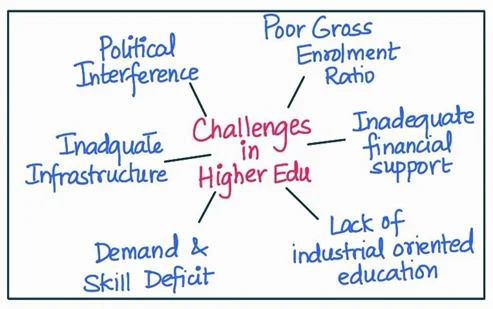Answer:
| Approach:
Introduction
- Introduce the idea of the entry of foreign educational institutions as a potential solution.
Body
- Discuss how the entry of foreign educational institutions could enhance the quality of higher education in India.
- Discuss the potential challenges associated with the entry of foreign educational institutions.
Conclusion
- Conclude by summarizing the potential benefits and challenges associated with the entry of foreign educational institutions in India.
|
Introduction:
The quality of higher education in India is a matter of concern as highlighted by various international rankings like the QS World University Rankings and Times Higher Education World University Rankings, where Indian universities often rank low.

Body:
Potential Benefits:
- Quality Enhancement: Foreign universities often have high academic standards and rigorous quality controls. Their entry could create a competitive environment, pushing domestic institutions to improve their quality to retain students.
- Access to Global Best Practices: They could bring in global best practices in teaching, curriculum design, research, and institutional governance, which could enrich the Indian higher education ecosystem.
- Diverse Choices: Students would have more choices in terms of courses and disciplines, including access to courses not commonly offered by Indian institutions.
- Reduced Brain Drain: Many Indian students go abroad for quality education. The presence of foreign institutions in India could help retain some of these students, reducing brain drain.
Potential Challenges:
- Regulation and Quality Control: Ensuring that foreign institutions maintain their home-campus standards in India would be a challenge. There are risks of low-quality institutions entering the market or existing institutions offering sub-standard programs.
- Affordability: Foreign universities might charge high fees, making them accessible only to a small section of society. This could exacerbate educational inequalities.
- Focus on Profitability: There could be concerns that foreign institutions might prioritize profitability over education quality or social responsibility.
- Impact on Domestic Institutions: Their entry might put domestic institutions, especially those that are already struggling, at a disadvantage.
To ensure that the entry of foreign educational institutions helps improve the quality of higher and technical education,
- the government needs to create a robust regulatory framework to ensure quality control,
- prevent commercialization of education, and
- promote collaboration between foreign and domestic institutions.
Conclusion:
While the entry of foreign institutions could potentially improve the quality of higher education in India, careful planning and stringent regulation are required to ensure that the benefits outweigh the potential drawbacks. It should not be seen as a standalone solution, but as part of a broader strategy to improve the overall quality of higher education in India.
